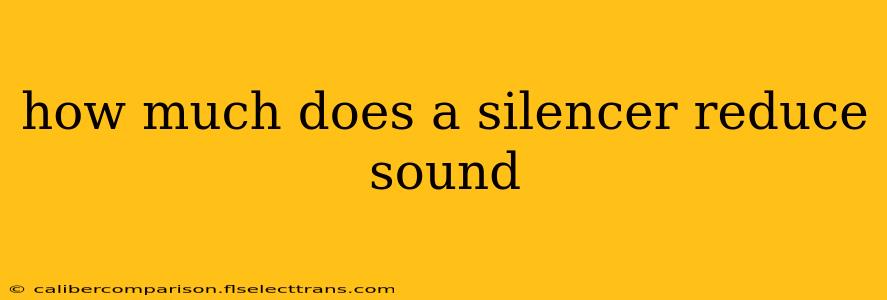How Much Does a Silencer Reduce Sound? A Comprehensive Look at Firearm Suppressors
The question of how much a silencer reduces sound is a common one, often shrouded in Hollywood-esque portrayals of near-silent weaponry. The reality, however, is more nuanced. A silencer, more accurately termed a suppressor, doesn't make a firearm silent, but it significantly reduces the sound. The degree of reduction depends on several factors.
Understanding Decibels and Sound Reduction
Sound is measured in decibels (dB). A normal conversation hovers around 60 dB, while a gunshot can range from 140 to 170 dB – potentially causing hearing damage or even permanent hearing loss. Suppressors work by reducing the escaping gases that create the loud bang of a firearm. They don't eliminate the sound entirely, but rather muffle it.
Factors Affecting Sound Reduction:
Several factors influence the effectiveness of a suppressor in reducing sound:
-
Caliber of the firearm: Larger calibers generally produce louder reports, making sound reduction more challenging. A suppressor designed for a .22LR will be far more effective at reducing sound than one designed for a .300 Winchester Magnum.
-
Type of ammunition: The type of ammunition used, particularly the powder charge, significantly impacts the sound level. Subsonic ammunition (bullets traveling slower than the speed of sound) is crucial for optimal sound reduction with suppressors. Supersonic rounds will still create a sonic boom, even with a suppressor.
-
Suppressor design and quality: Different suppressor designs and manufacturers offer varying levels of sound reduction. Higher-quality suppressors, often using more advanced materials and engineering, tend to offer superior performance.
-
Firearm's design: The firearm's barrel length and the overall design can influence how effectively a suppressor reduces sound.
-
Shooting environment: The surrounding environment can affect how the suppressed sound travels and is perceived.
Typical Sound Reduction:
While precise figures vary widely based on the factors mentioned above, a suppressor can typically reduce the sound of a firearm by 20 to 35 dB. This significant reduction translates to a noticeable difference, making the gunshot sound more akin to a loud bang than the explosive crack of an unsuppressed weapon. However, it's important to remember that even with a suppressor, hearing protection is still strongly recommended.
The Myth of "Silent" Weapons:
Hollywood often depicts suppressors as making firearms virtually silent. This is inaccurate. While a suppressor significantly reduces the sound, it doesn't eliminate it entirely. The sound of the gunshot will still be audible, albeit considerably quieter.
Legal Considerations:
The legality of owning and using suppressors varies significantly by jurisdiction. It's crucial to understand and abide by all applicable federal, state, and local laws before purchasing or using a suppressor.
Conclusion:
Suppressors offer a substantial reduction in the sound of firearms, making them a valuable tool for hunters, competitive shooters, and law enforcement. However, understanding the limitations of sound reduction is crucial. They don't create "silent" weapons, but they dramatically reduce the noise level, contributing to a safer and more comfortable shooting experience. Always remember to prioritize hearing safety, even when using a suppressor.

